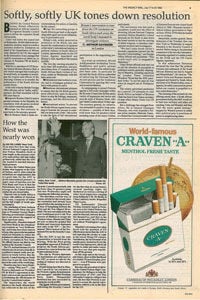
The world pays tribute to Mandela (slideshow)
As South Africans come to terms with the loss of former president Nelson Mandela, the rest of the world bids farewell to Madiba.

Pimples: Saving Madiba's rabbit (video)
Gwede, Mac and Blade try their best to stop the rabbit from whispering in Mandela's ear. But the elusive animal has some tricks up its sleeve.

Zapiro's best Madiba cartoons (slideshow)
From his toughest moments to his most triumphant, Madiba has been an inspiration. Here are some of our favourite Zapiro cartoons about him from 1994 to 2013.

Mandela: SA's greatest son laid to rest (slideshow)
The world watched as Nelson Mandela was finally laid to rest in his hometown of Qunu following a dignified and moving funeral ceremony on Sunday.
In an interview here this week, African National Congress president Nelson Mandela dwelt at some length on the pressure exerted by mass action, and only rather perfunctorily added that the ANC also wanted to marshal international pressure.
But since the United States now decides what happens at the United Nations, and to what extent its resolutions are implemented, this is a, good time for the ANC to invoke international pressure. A major cause of inaction over the West Bank and Gaza is that the Palestinians have no domestic leverage in the United States to combat the pro-Israel lobby.
Majority rule in South Africa is a cause with millions of American black votes, a majority of whites and the full weight of world opinion behind it. The sidelining of Jesse Jackson in the Democratic Party may give hope to President George Bush's faltering presidential campaign that it can attract the support of black American voters.
Significantly, Mandela himself described Bush in his telephone conversations as "very forthcoming", and it may have been concern to keep a line open to the incumbent which led Mandela to refuse the invitation to address the Democratic Party convention in New York.
The official reason was that he was needed at the Security Council. The UN, not least because of a US refusal to pay its arrears is hardly in a position to launch costly new initiatives in South Africa. But the Security Council hearing on South Africa has to put the issue firmly back in the centre of the world stage.
Mandela may have been dismissive -- asking "Why now?" -- but Western diplomats see President FW de Klerk's agreement to disband controversial special forces as betokening the effectiveness of Security Council intervention.
The importance the world attaches to the South African issue was reflected in the size or the
Security Council session itself, with no fewer than 54 speakers going late into Wednesday night and resuming the following morning.
The marathon exercise was, of course, strictly for the record, since the resolution had already been agreed before the meeting in several days of bargaining between the West and the Non-Aligned Movement.
The text was subjected to the now traditional post-Cold War process of dilution to escape the Western vetoes. (Russia and China are now so taken for granted that British and American diplomats now refer to the "P3" -- the Permanent Three instead of the Permanent Five on the Security Council.)
But the ANC is not the only organisation to benefit from the hearing. With the West giving unqualified approval of Pretoria's progress, the South African government has come from the cold in international terms. The calls by Western diplomats for, negotiations are addressed to the ANC as much as calls for the ending of violence are, directed at De Klerk.
Despite being described in Mandela's speech as "an extension of the Pretoria regime, its instrument and surrogate", Inkatha Freedom Party leader Mangosutho Buthelezi has also succeeded in raising his world profile.
The South African government addressing the Security Council for the first time in recent history, secured speaking rights for Buthelezi as well as a string of other loyal supporters ranging from Solidarity's Dr JN Reddy to Ciskei military leader Brigadier Oupa Gqozo.
US Ambassador Edward Perkins, formerly based in Pretoria, now at the United Nations has stressed privately that any solution must be internal, between the parties themselves, and that in the "new world order', the UN will not act without Washington's agreement.
Mandela's circumspection when faced with the question of UN effectiveness shows that the ANC is not expecting the cavalry to come to the rescue flying UN colours.
Nonetheless the involvement of an outside party, backed as it is by the world's last superpower, allows all parties to claim and make concessions in a way that gets negotiations off the ground.
At this stage and in the foreseeable future, there is little likelihood of a sizable UN peacekeeping presence -- even if Pretoria were prepared to accept it.
But since the precedent of allowing the United Nations High Commissioner for Refugees to help the repatriation of ANC and Pan Africanist Congress refugees last year, the fact that Pretoria is prepared to accept the special representative reflects a toe w the door for the UN.


